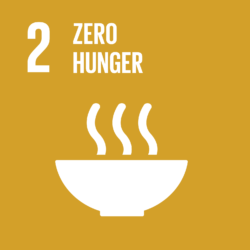
Let’s End World Hunger

One of the great travesties of our time is how many people go hungry on the planet even though we produce so much food.
Sustainable Development Goal 2 aims to address this injustice, ending world hunger and ensuring food security.
For many of us this is not an injustice we have experienced, living in an affluent and developed society with food available to us at all times in numerous ways. But even if you have never been touched by extreme hunger or famine you should understand the need to eliminate this evil from humanity.
Let’s look at three things that need to be done in order to finally solve world hunger.
The first thing, given the fact that we’re looking at a sustainable development goal, should be obvious: sustainability. We need to create sustainable food systems to better serve the needs of people across the globe.
ActionAid has been exploring the problem and has created a Climate Resilient Sustainable Agriculture (CRSA) framework to help farmers in over 40 countries manage the coming crisis. By working with the governments and the farmers ActionAid is able to increase awareness of agroecological farming and improve the farming process for smaller farmers.
Canada is also aiming to find a solution. The BC Agriculture & Food Climate Action Initiative, run by the BC Agriculture Council, has been investigating what can be done to help its farmers manage climate change.
Meanwhile the Canada-Ontario Environmental Farm Plan aims to give farmers the support they need to make their farms more sustainable and Lake Erie Agriculture Demonstrating Sustainability (LEADS) will give farmers the chance to update their farms to improve their soil health and reduce greenhouse gas emissions.
It is very important that these systems are established now and not before we reach crisis mode, as food is something we can’t live without. Sustainable farming is our best way to ensure food security both today and in the future. Make sure you support sustainable farming whenever you can as these are the food suppliers ensuring we will still have food in the coming days.
There is another form of agriculture that could help reduce hunger across the globe and this is urban farming.
Although this may seem unbelievable, around one-quarter of the undernourished population live in cities. The reason for this is the evil that is food deserts, depriving people of access to healthy food options. As more people move to cities many find themselves in food deserts, and the need to increase access to fresh produce is becoming more of an issue.
This is where urban farming comes in. By turning plots of land into community gardens people gain new access to needed nourishment and can also gain a greater appreciation for and knowledge of what they are feeding themselves.
Urban farming is spreading widely (major local examples include Toronto’s Toronto Urban Growers and Hamilton’s McQuesten Urban Farm or New York City’s NYC Agriculture Collective) and vertical farming (a subsection of urban farming) will be worth $3.88 billion by 2020.
On top of providing needed nourishment urban farming can help reduce our carbon footprint and improve the livability of our cities.
Urban farming is an easy and tasty way to increase the world’s access to food and in turn reduce malnourishment. Everyone should be behind it.
The final way to reduce hunger is probably both the most important and the hardest to achieve. We need to end war and conflict.
When you consider that the majority of the world’s severe food crises are caused by conflict and close to 600, 000 children died last year because of war-caused malnutrition you can see how dire the situation is.
Look at what is happening now in places like Yemen, where war results in a radical depreciation of the currency and the destruction of employment opportunities. The people living here suffer a terrible existence, with millions living at risk of starvation.
In 2018 the United Nations passed a resolution to protect food sources during conflicts and condemn starvation as a form of warfare. This is a resolution we cannot afford to break.
War and conflict have been a part of humanity since the dawn of time but the cost of it is way too high. If we want to eradicate hunger the world over we will have to learn to put down our battle arms as well.
We have the resources to ensure no mouth goes unfed. We can solve world hunger and we can do it without radically reducing our lives. This should be a no-brainer.
Starvation is a terrible injustice forced upon people—many of whom are still children—and it can radically impact their ability to function in the world at large.
If we wait to find solutions the problem will only continue to grow. Let’s work together to ensure everyone has access to food. It’s the right thing to do.

